Lebanon’s Finance Minister Ali Hassan Khalil (2nd L) stands near Head of Lebanon’s Hezbollah’s parliamentary bloc Mohamed Raad (3rdL) and leader of the Marada movement Suleiman Franjieh (2nd R)
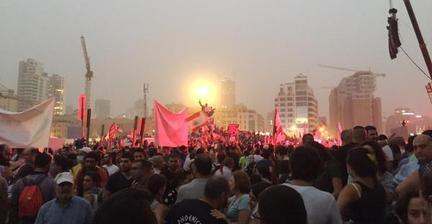
Several thousand demonstrators returned to the streets of Beirut on Wednesday, September 9, for the latest “You Stink” protest against an ongoing trash crisis in the Lebanese capital as politicians assembled to discuss the situation. The protest movement was triggered by the government’s inaction in the face of a mounting garbage collection crisis, which demonstrators say is emblematic of endemic corruption and poor public services in the nation.
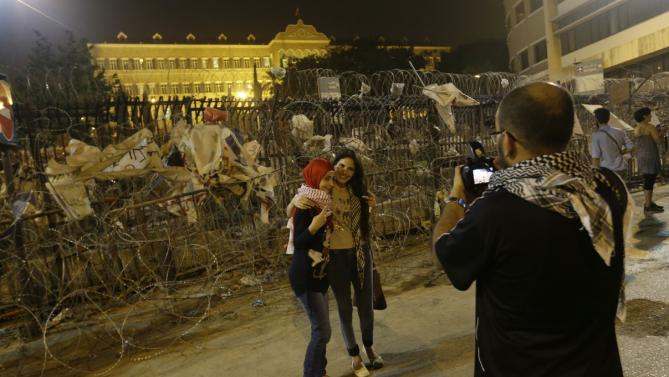
Lebanese women have their photograph taken in front barbed wire near the main Lebanese government building, in downtown Beirut, Lebanon, Wednesday, Sept. 9, 2015. Lebanon’s prime minister says he hopes that political talks between senior politicians will help end government paralysis that has sparked angry street protests. (AP Photo/Hassan Ammar)
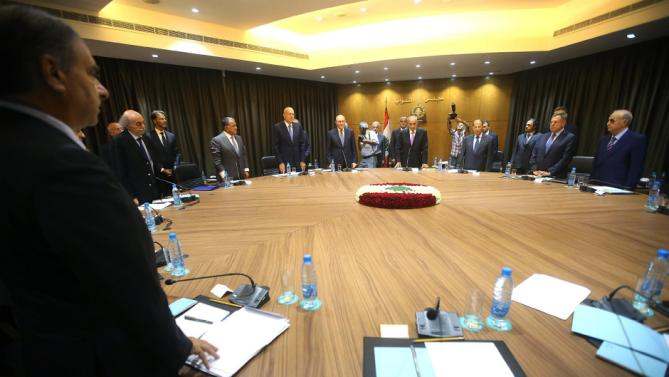
Lebanese political leaders, stand around a round table as they listen to the Lebanese national anthem, during the opening session of the National Dialogue, in the Parliament building, in downtown Beirut, Lebanon, Wednesday, Sept. 9, 2015. Lebanon’s prime minister Tammam Salam says he hopes that political talks between senior politicians will help end government paralysis that has sparked angry street protests. Salam also called for a Cabinet meeting later Wednesday to discuss the issue of garbage collection. (AP Photo/Hussein Malla)
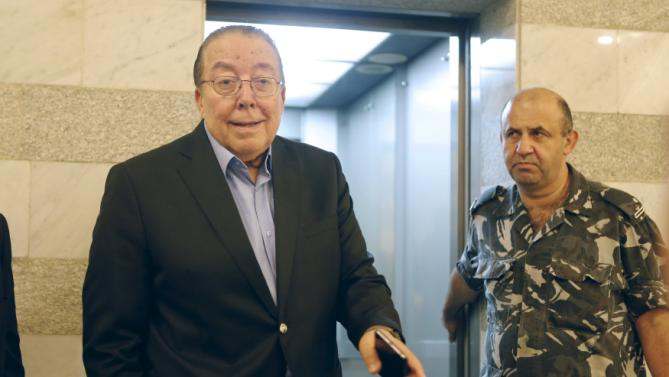
Lebanese Minister of the Environment Mohammad Machnouk speaks to the media upon his arrival at the government palace to attend an emergency cabinet session in downtown Beirut, Lebanon September 9, 2015. Lebanese security services locked down central Beirut on Wednesday as ministers and MPs met to discuss ways out of a political crisis that has paralysed government and fueled a wave of street protests. Ministers, but not a full cabinet, then headed for the government headquarters nearby, the state news agency said, for an emergency cabinet session Prime Minister Tammam Salam had called for earlier in the day. REUTERS/Mohamed Azaki
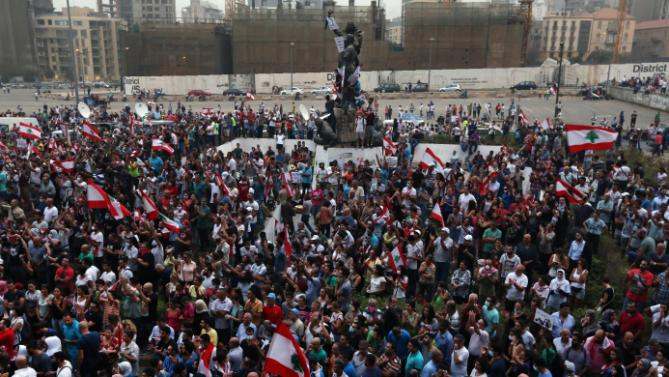
Lebanese anti-government protesters shout slogans as they hold their national flags, during a protest against the on-going trash crisis and government corruption, in downtown Beirut, Lebanon, Wednesday, Sept. 9, 2015. Lebanon’s prime minister says he hopes that political talks between senior politicians will help end government paralysis that has sparked angry street protests. (AP Photo/Bilal Hussein)
By John Davison
BEIRUT (Reuters) – Lebanon‘s government agreed a plan to resolve a waste disposal crisis late on Wednesday, ending a dispute that has caused piles of rubbish to fester on Beirut’s streets and triggered a wave of popular protests.
The long-term plan, agreed on during an emergency cabinet meeting gives municipalities a main role in treating local wastewith expert help and supervision, and also assigns two landfills in Akkar and in Masnaa area near the border with Syria. "We see that this plan meets the conditions.. Tonight the cabinet agreed on an environmental solution path that is sustainable and safe," Agriculture Minister Akram Shehayeb, who led the team to draft the plan, told reporters after the cabinet meeting.
It was not immediately clear if the plan requires parliamentary approval or if the Lebanese who took to the streets to protest would accept it.
The waste crisis triggered wide public protests with some angry Lebanese calling for resignation of the government.
The cabinet meeting, which lasted for a few hours, came shortly after a "national dialogue" meeting which ended with no apparent decision on a way out of the deadlock.
A spokesman said that another session would be held in a week’s time.
On Wednesday, Lebanese security services locked down central Beirut as protesters mobilised against government failures, including a rubbish disposal crisis that has allowed garbage to pile up in Beirut.
The protesters were kept away from government buildings by soldiers and barbed wire fences as politicians held meetings behind the barricades.
The demonstrators, who in recent weeks have mobilised in their thousands independently of the main sectarian parties, waved Lebanese flags and held banners calling for change and denouncing what they view as a corrupt political system.
"The people who rebelled on August 29 in Martyrs’ Square are here to tell them (politicians), your time is over – it is time for change today," activist Samer Mazeh said.
Beirut’s central Martyrs’ Square has become the focal point of protests after demonstrations at the end of August turned violent.
Demonstrators said the national dialogue was doomed to failure.
Hundreds of soldiers lined entrances to downtown Beirut early on Wednesday, locking down the area before politicians were due to arrive. Armoured vehicles lined streets in the sweltering summer heat as a sandstorm engulfed Lebanon for a second day.
Prime Minister Tammam Salam urged politicians ahead of the meetings to "participate in an active and positive way to make this dialogue successful, to help us out of this aggravated crisis".
The garbage is "putting pressure on the people and stirring the people’s anger. We share the anger if we cannot reach a cure," Salam said before the cabinet meeting.
Salam has expressed frustration at the failings of his cabinet which struggled to resolve the garbage problem triggered by the closure of Beirut’s main rubbish tip in July.
He threatened to resign last month as protests calling for a solution to the rubbish crisis turned into calls for the cabinet to step down.
"This government is afraid of its people, closing the roads to a constitutional institution – the parliament. We should be protesting today in front of the parliament, peacefully," said Marwan Maalouf, one of the founders of the "You Stink" campaign, in an interview with New TV.
The protests have been organised independently of the main sectarian parties, posing a challenge to their influence.
The Lebanese parliament, like other institutions of state, has barely functioned in recent years in a political crisis linked to wider regional turmoil, including the war in neighbouring Syria.
Salam’s cabinet includes Shi’ite Muslim group Hezbollah, which is backed by Iran, and the Future Movement, led by the Saudi-backed Sunni politician Saad al-Hariri, together with rival Christian parties.
The presidency reserved for a Maronite Christian has been vacant for more than a year, with no consensus on who should fill it. It was the top item at the national dialogue meeting.
(Additional reporting by Sylvia Westall; Editing by Tom Perry and Angus MacSwan)



